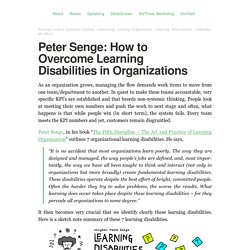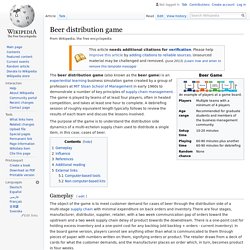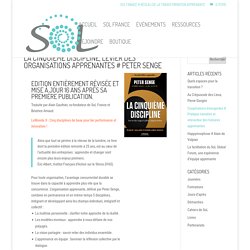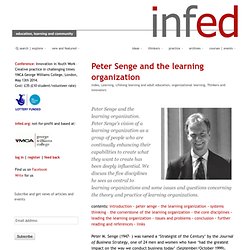

Peter Senge: How to Overcome Learning Disabilities in Organizations – Tanmay Vora. As an organization grows, managing the flow demands work items to move from one team/department to another.

In quest to make these teams accountable, very specific KPI’s are established and that breeds non-systemic thinking. People look at meeting their own numbers and push the work to next stage and often, what happens is that while people win (in short term), the system fails. Every team meets the KPI numbers and yet, customers remain disgruntled. Peter Senge, in his book “The Fifth Discipline – The Art and Practice of Learning Organization” outlines 7 organizational learning disabilities. He says, Beer distribution game - Wikipedia. The beer distribution game (also known as the beer game) is an experiential learning business simulation game created by a group of professors at MIT Sloan School of Management in early 1960s to demonstrate a number of key principles of supply chain management.

The game is played by teams of at least four players, often in heated competition, and takes at least one hour to complete. A debriefing session of roughly equivalent length typically follows to review the results of each team and discuss the lessons involved. The purpose of the game is to understand the distribution side dynamics of a multi-echelon supply chain used to distribute a single item, in this case, cases of beer. Gameplay[edit] The object of the game is to meet customer demand for cases of beer through the distribution side of a multi-stage supply chain with minimal expenditure on back orders and inventory. Verbal communication between players is against the rules so feelings of confusion and disappointment are common. La cinquième discipline, levier des organisations apprenantes # Peter Senge. Traduite par Alain Gauthier, co-fondateur de SoL France et Béatrice Arnaud.

LeMonde.fr : Cinq disciplines de base pour lier performance et innovation ! Alors que tout se périme à la vitesse de la lumière, ce livre dont la première édition remonte à 25 ans, est au cœur de l’actualité des entreprises : apprendre et changer sont encore plus leurs enjeux premiers. Éric Albert, Institut Français d’Action sur le Stress (IFAS). Pour toute organisation, l’avantage concurrentiel durable se trouve dans la capacité à apprendre plus vite que la concurrence. L’organisation apprenante, définie par Peter Senge, combine en permanence et en même temps 5 disciplines, intégrant et développant ainsi les champs individuel, intégratif et collectif : 17 79. Réseau de la transformation apprenante.
9782212559378. La cinquième discipline, levier des organisations apprenantes # Peter Senge. Peter Senge and the learning organization. Contents: introduction · peter senge · the learning organization · systems thinking – the cornerstone of the learning organization · the core disciplines · leading the learning organization · issues and problems · conclusion · further reading and references · links Peter M.

Senge (1947- ) was named a ‘Strategist of the Century’ by the Journal of Business Strategy, one of 24 men and women who have ‘had the greatest impact on the way we conduct business today’ (September/October 1999). While he has studied how firms and organizations develop adaptive capabilities for many years at MIT (Massachusetts Institute of Technology), it was Peter Senge’s 1990 book The Fifth Discipline that brought him firmly into the limelight and popularized the concept of the ‘learning organization’. Since its publication, more than a million copies have been sold and in 1997, Harvard Business Review identified it as one of the seminal management books of the past 75 years.
Dr. Peter Senge speaks on Organizational Dynamics, Culture, and Generational Leadership. Peter Senge: My Definition of Leadership.